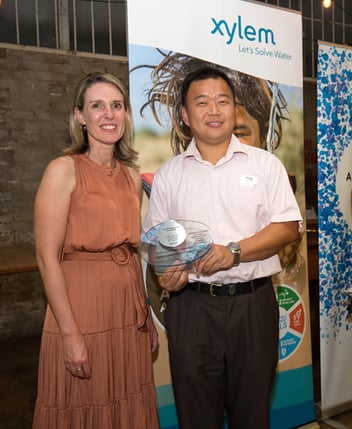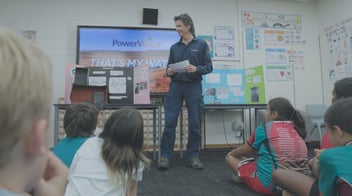DC Water’s blooming biosolids business
DC Water might not be the first water business to turn sewage into a usable product, but it is quickly becoming a successful example of the circular economy in action.
The utility, which is located in Washington, D.C., collects about 1GL of wastewater per day. This is treated at its Blue Plains Advanced Wastewater Treatment Plant and, until four years ago, was processed into Class B biosolids that were trucked to farmers in Virginia, about 300 km away.
In 2015, DC Water decided to change the model, switching from offloading a byproduct to creating a resource people would pay for, and becoming more sustainable in the process.
It began anaerobic digestion, converting half the organic matter from its water treatment process into methane to help power the plant’s operations. The remaining solids began to be processed into its Class A biosolids product, Bloom.
While Class A and B biosolids are similar, Class A cannot contain any pathogens. This means they can be used as fertiliser on farms and vegetable gardens, and can be sold to home gardeners.
“Converting to Class A lowered our carbon footprint, produces 8 megawatts of clean, green, renewable power, generates renewable energy credits and reduces our operating costs by US$25 million per year,” DC Water Director of Resource Recovery Chris Peot said ahead of his keynote address, sponsored by Watercare, at the AWA/ANZBP Biosolids Conference in February.
The road to Bloom
The original plan to develop a Class A product involved installing eight thermophilic digesters. But with bids for the project coming in at US$600 million – 50% over budget – the utility’s board gave its technical team a mandate: come back in two years with a cheaper option.
Peot said the problem was that any technology the team chose had to be operational at a plant of at least 20 million gallons/day for at least five years of successful operation in North America.
“A couple of us told the executive team we felt we could come in under budget and get a great biosolids product if we took those last three words – in North America – out of the technical specs, because we were aware of all the large thermal hydrolysis facilities in Europe,” he said.
After two years, several trips to Europe to vet the technology and numerous research projects, DC Water became the first utility in North America to use thermal hydrolysis.
“It is high heat and pressure, and the process bursts the cell walls, making it much easier to mix. Thermal hydrolysis solids can be fed to a digester at about 10% solids instead of the traditional 5%, which means we needed only half the digester volume,” Peot said.
“So, for an investment of about $25 million in thermal hydrolysis, we saved four digesters, or about $200 million. Taking out those three words saved the project.”
Selling sewage
But DC Water didn’t just switch to a better class of biosolids – it created a marketable product.
Today, the utility produces 165,000 wet tonnes of Class A biosolids per year. It sold about 11,000 tonnes in 2018 and has a goal of 40,000 in sales this year.
Peot said selling the public on biosolids is a constant education process about the use and environmental benefits of recycling a product that many would rather flush and forget.
“We have an extensive outreach program and participate in agriculture events,” he said.
“Selling a biosolids product is not a passive activity – it requires stakeholder and customer engagement in order to build trust and demonstrate benefits.”
To expand its market, DC Water is now planning to build a curing facility for Bloom onsite.
“We intend to sell a wide variety of blends to landscapers and to the public, and curing or windrow drying makes a product that looks more like soil and will command a higher price,” Peot said.
“One of our customers buys fresh Bloom from us, cures it at his facility and sells it for six times his purchase price. We hope to duplicate this effort and diversify our product line.”
You can hear more from Chris Peot about DC Water’s biosolids business in his keynote address, sponsored by Watercare, at the AWA/ANZBP Biosolids Conference next month. To learn more and to register, click here.


